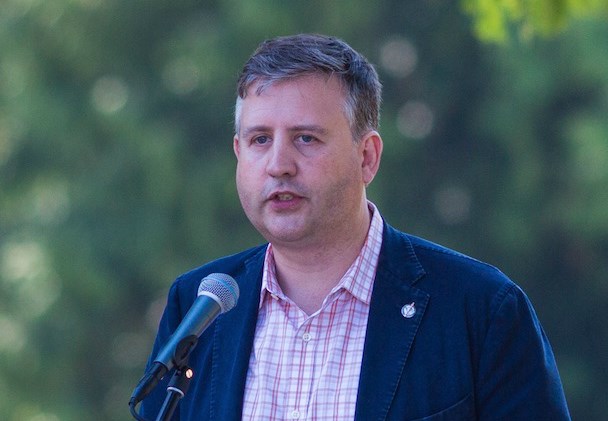Three months after losing the Vancouver mayoralty to Ken Sim, Kennedy Stewart said he is excited to be back at Simon Fraser University with a promotion.
Stewart announced Monday he is the new director of the Centre for Public Policy Research, almost a dozen years after he put his career as a political science professor on hold to become the NDP MP for Burnaby-Douglas. He also has a book manuscript due at month-end.
“It was nice to just catch my breath after such a busy time in my life,” Stewart said of the last few months of 2022. “I love writing. It's kind of something I really missed.”
When Stewart missed out on a second term in the Oct. 15 civic election, he became the first incumbent to lose since one of his mentors, Mike Harcourt, defeated Jack Volrich in 1980. Despite Sim and his ABC Vancouver landslide, Stewart won’t say no to another run at public office.
“What I've learned over the years, is that you really have to have a window to walk through and right now I don’t see — there’s not a window that's open for me, and that's fine,” Stewart said. “There may never be another window that's open for me. But, you always, always keep your eye open.”
The book he’s working on is called “Decrim: How We Decriminalized Drugs in British Columbia,” through Douglas and McIntyre. The Jan. 31 deadline coincides with the beginning of Health Canada’s three-year pilot project to decriminalize possession of up to 2.5 grams of hard drugs. When the book hits the shelves in spring, Stewart said readers won’t get an academic or health-flavoured tome. Instead, an insider’s lesson on how to make tough policy changes that will include the perspective of a mayor during two deadly public health crises.
"It's hard to disentangle the two because they're so connected,” Stewart said.
Looking back at his four years at 12th and Cambie, and the 2022 campaign, Stewart said he has no regret. He came as advertised.
“I was arrested and tried to stop the pipeline, six months before I took over the mayor's position, so people knew what they were getting was a very progressive mayor. And so, you know, the shingle that I hung out in both elections was exactly that. I was going to do everything I could on the drug issue, tried to push transit forward, especially the SkyTrain to UBC, and to build as much housing as possible.”
Stewart also became known as a critic of the Vancouver Police Department, after the December 2019 public handcuffing of a Bella Bella Indigenous man and his granddaughter who were trying to open a bank account at a downtown BMO branch.
“I think as a mayor, you have a duty to call that out,” he said.
Stewart didn’t stop there. He voted in 2020 to cut the VPD budget by 1%. In early 2022, with a highly publicized spike in repeat offenders assaulting strangers, he gave opponents a gift by calling the city safe. The Vancouver Police Union registered as a third-party for the first time and endorsed Sim for mayor.
“My opponents tagged me with that, fairly or unfairly, and you know what's remarkable is, the city's exactly the same as it was on October 15, it’s exactly the same as it was on October 16,” he said. “But you're not seeing the same level of kind of outcry about this, and that, to me, shows you how much of that was just part of a political campaign.”
Voters got their wish, he said, electing a centre-right mayor who wants to be tough on crime. “All evidence shows that that approach won't do anything, but I guess time will tell.”
A bigger factor in his defeat, Stewart believes, was his aggressive support for the Broadway Plan, which got Westside homeowners “pretty angry at me.”
“If you look at some of those public hearings, you're trying to put in a six-storey rental building in Kits and you have hundreds and hundreds and hundreds of Westside residents coming out and fighting it. You know, that went all the way through the four years of my mayoralty.”
Canadian Security Intelligence Service agents paid Stewart a visit at the end of last May, warning that the government of China could meddle in his bid for a second term. In early 2021, Stewart had sworn-off meetings with Chinese officials after Beijing sanctioned Conservative MP Michael Chong, his collaborator on a political science volume, after the vote to declare China’s treatment of Uyghur Muslims as genocide. Stewart was also keen on exploring closer trade with Taiwan through a friendship city arrangement with Kaohsiung, and expressed support for U.S. House Speaker Nancy Pelosi’s visit to Taiwan last summer in an interview with a Chinese-language newspaper.
“We did pick up on the ground through the campaign a couple of instances where [foreign interference] may have been the case, but it's it's hard to prove that,” Stewart said.
“For me, I’ll always land on the side of democracies. I am very worried about the Taiwan situation. I think you look at what's happening in Ukraine now and how that affects both local people and the world economy, I think we have we have a high risk of that happening in Taiwan as well.”
What was the biggest lesson Stewart learned in office, that he will convey to students in the classroom? The pace of policymaking. Such as when he successfully urged health officials to close bars and restaurants early in the pandemic, effectively cancelling St. Patrick’s Day celebrations.
“If you screw up, you totally wear it and it is hard to shake, and if you do get it right, you may not succeed in getting the change you need. So that's it, it's the speed, it was quite astounding of how fast you had to pick the course that you were going to follow.”




